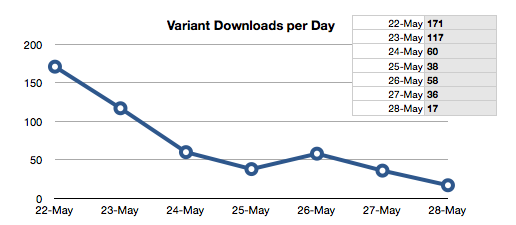 The NY Times has an article today about [The Variant](http://johnaugust.com/variant), the Kindle
The NY Times has an article today about [The Variant](http://johnaugust.com/variant), the Kindle, and my [Twitter followers](http://twitter.com/johnaugust).
> Mr. August, who wrote it for possible inclusion in an anthology of work by well-known screenwriters, tested the story with about two dozen of the 6,000 or so people who follow him on Twitter. They persuaded him to change the first sentence, trim some paragraphs and shorten the title from “The Egyptian Variant.”
You can read the whole article [here](http://www.nytimes.com/2009/06/01/business/media/01august.html).
One correction: In the interview, I said that I’d earned enough to buy “about four Kindles.” But I misremembered how much they cost: $359.
As of Friday, I’d made enough to buy 2.73 Kindles.

